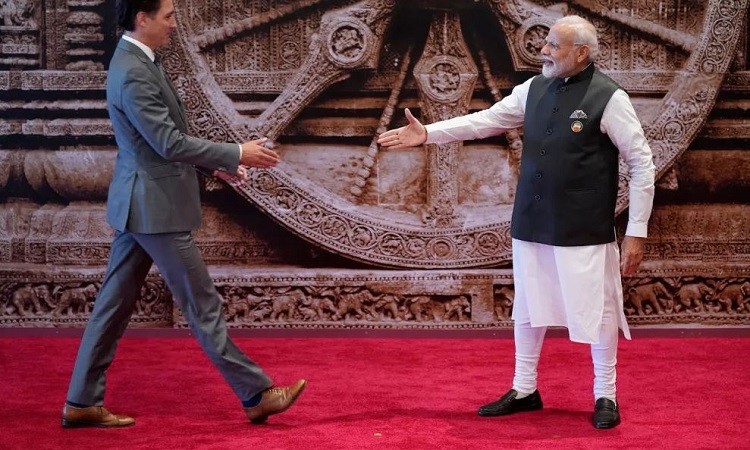
Canada's recent call for private negotiations underscores the significant foreign policy blunder committed by Prime Minister Justin Trudeau when he accused India of potential involvement in the assassination of Khalistan terrorist Hardeep Singh Nijjar. This move led to a strong and immediate response from India, with visa services in Canada suspended and concerns expressed about the safety of Indian diplomats due to threats from Khalistan supporters. The Indian government further demanded the recall of over 20 Canadian diplomats, with reports suggesting that around 40 Canadian diplomats have been instructed to leave India by October 10.
In the face of resolute opposition from New Delhi and a robust rebuke from the Modi administration, Canada now seems to be reevaluating its stance in this ongoing diplomatic dispute concerning the Khalistani terrorist's murder.
On Tuesday, Canadian Foreign Minister Melanie Jolie expressed her country's desire to "engage privately with India to resolve this diplomatic dispute," according to Reuters. Jolie emphasized the seriousness with which Canada takes the security of its diplomats and stressed the importance of keeping diplomatic conversations confidential.
Trudeau's actions raise questions about his ability to assess India's strong foreign policy and the consequences of his accusations against a key trading partner and ally. Canada has yet to provide substantial evidence to support its claims regarding the Indian government's involvement, highlighting the hasty and ill-considered nature of Trudeau's foreign policy decisions.
Trudeau appears to have underestimated the repercussions of stirring controversy and committing a significant political blunder that strains Canada's relations with a powerful nation like India. His remarks are seen as a result of political maneuvering within Canada, where he may be pandering to fringe elements to maintain his government's minority position in the House of Commons.
It is essential to recognize India's influential role in countering China's geopolitical influence, making it a crucial partner for Canada and its allies such as the US, France, and the UK, both strategically and economically. Canada's desire for private discussions only reinforces India's standing on the global stage, particularly as the world seeks to strengthen ties with the "Global South," where India has asserted its leadership.
Trudeau's foreign policy blunders have become increasingly evident, but his approach to India, the world's fastest-growing economy, will be remembered for the wrong reasons. He failed to realize that straining relations with New Delhi would also entail a significant economic setback. At a time when Canada and the West were looking to reduce their dependence on Chinese trade, India represented a viable alternative. Experts in foreign policy argue that Canada, by distancing itself from China, could have benefited from increased trade with India.
Canada's insistence on private negotiations with India suggests that Trudeau may have shared incomplete intelligence to divert attention from domestic political issues in Canada. However, in doing so, he disregarded India's emergence as a powerful global leader under PM Modi, with a focus on a nation-first policy on the global stage.
Trudeau's failure to substantiate his accusations against India reflects poorly on him, with Canadians bearing the consequences of his impulsive actions. This abrupt shift in approach leaves both Canada and its leader in an awkward position, appearing to admit that their initial claims lacked credibility.
This sequence of events underscores the importance of careful diplomacy and the necessity for a consistent and well-considered approach to international relations. Accusing a country publicly without sufficient evidence can lead to serious repercussions, and attempting to reverse such accusations in private may not easily mend the damage done. Trudeau's actions in this situation raise concerns about his government's competence in foreign policy and its ability to navigate complex international relationships.
Furthermore, Trudeau's handling of this situation has not only strained Canada's relationship with India but also placed Canada's global standing in jeopardy. It has highlighted the need for a more strategic and informed approach to international affairs.
Canada's actions have implications beyond its immediate diplomatic fallout. They raise concerns about Canada's reliability as a partner in the international community. Accusations made without concrete evidence not only undermine trust but also weaken Canada's credibility on the global stage. Other nations may become cautious about engaging in diplomatic and economic partnerships with a country that appears to make impulsive and unsupported claims.
Moreover, Trudeau's misstep underscores the shifting dynamics of global power. India's rise as an influential player in global affairs, both economically and geopolitically, cannot be underestimated. The country's assertive stance on international issues and its robust economic growth have made it a key player in shaping the future of the Global South.
In this context, Canada's attempt to privately resolve the dispute with India may be seen as an admission of wrongdoing. It reflects a realization that India's position in global affairs cannot be taken lightly, and that diplomatic relations should be handled with care and respect.
Trudeau's actions have also ignited a debate within Canada about the role of foreign policy in domestic politics. His apparent alignment with elements sympathetic to Khalistan separatism has raised questions about the extent to which domestic politics should influence international relations. Balancing domestic political interests with responsible foreign policy decisions is a challenge that Trudeau's government must address moving forward.
The Canadian Prime Minister's accusatory stance towards India has proven to be a foreign policy blunder with far-reaching consequences. It has strained diplomatic relations, undermined Canada's global credibility, and exposed the need for a more measured and thoughtful approach to international affairs. As the world continues to evolve, nations must recognize the changing power dynamics and navigate them with tact, respect, and evidence-based decision-making. Trudeau's handling of this situation serves as a stark reminder of the importance of these principles in today's interconnected world.